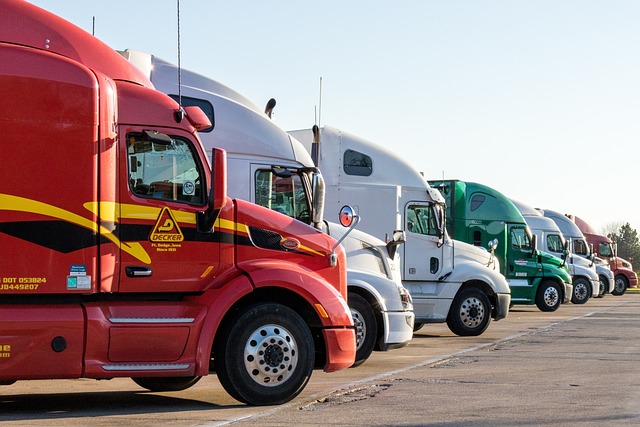Small trucking fleets face complex insurance challenges, requiring strategic risk management and tailored coverage. Essential policies include fleet liability, physical damage, and cargo insurance, with multi-truck policies offering streamlined administration and cost savings. Effective risk mitigation involves robust fleet safety programs focusing on driver training, maintenance, and advanced technology like telematics to reduce accidents and claims. By combining suitable insurance policies with strong safety measures, managers can confidently navigate the trucking insurance landscape, ensuring their operations' resilience and efficiency while securing affordable protection.
In the dynamic world of trucking, fleet managers face a labyrinthine landscape when it comes to insurance. Navigating complex policies and varying coverage options can be a daunting task, especially for small fleets operating on tight margins. This article equips fleet managers with the knowledge to confidently manage risk. We explore the intricacies of trucking insurance for small fleets, offering a step-by-step guide to securing comprehensive coverage. Additionally, we delve into affordable options, innovative policies, and effective risk management strategies to enhance fleet safety and mitigate claims.
Understanding the Complexities of Trucking Insurance for Small Fleets

Small fleets in the trucking industry face a complex web of insurance requirements and considerations that can be daunting. Navigating the intricacies of commercial truck insurance is essential for fleet managers to ensure comprehensive protection for their operations. With various types of coverage available, understanding the nuances is crucial. Fleet insurance coverage typically includes physical damage insurance, which protects against vehicle-related losses, and cargo insurance to safeguard the goods being transported. Additionally, fleet liability insurance is vital to mitigate risks associated with accidents or incidents involving third parties.
Effective risk management for small fleets involves more than just insurance. Implementing robust fleet safety programs can significantly reduce claims and improve overall operational efficiency. These programs should focus on driver training, regular vehicle maintenance, and adopting advanced technology for monitoring and tracking purposes. By combining appropriate insurance policies with strong safety measures, fleet managers can create a resilient foundation to confidently navigate the challenges of the trucking insurance landscape.
Securing Comprehensive Fleet Insurance Coverage: A Step-by-Step Guide

Securing adequate insurance coverage for your trucking or small fleet is a crucial step in managing risks and ensuring operations run smoothly. It involves understanding various policy options tailored to meet the unique needs of your fleet. Here’s a simplified guide:
1. Assess Your Fleet Risk Profile: Begin by evaluating your fleet’s liability potential, including vehicle and cargo value, operational distance, and driving history. This step is key in determining necessary coverage limits for physical damage insurance and cargo insurance.
2. Prioritize Key Coverages: Essential policies include fleet liability insurance to protect against third-party claims, physical damage insurance to cover repairs or replacements for your vehicles, and cargo insurance to safeguard the value of your freight. For operations involving multiple trucks, consider a multi-truck policy for streamlined coverage and management.
3. Explore Additional Protections: Depending on your fleet’s specific activities, explore specialized coverages like dispatchers’ legal liability (for those managing drivers) or roadside assistance policies for peace of mind during breakdowns.
4. Compare Affordable Fleet Insurance Options: Research reputable insurance providers offering competitive rates for small fleets. Compare policies based on coverage limits, deductibles, and inclusions to find the most affordable option without compromising quality.
5. Implement Fleet Safety Programs: Proactive fleet risk management includes implementing safety programs to reduce accidents and claims. These can include driver training, vehicle maintenance schedules, and technology solutions like telematics for better monitoring.
By following these steps, fleet managers can confidently navigate the insurance landscape, ensuring their operations are protected against potential risks associated with commercial truck ownership.
Affordable Options and Innovations in Commercial Truck Insurance

In today’s competitive trucking industry, small fleets face a complex task when it comes to securing adequate and affordable insurance coverage. However, numerous innovations in commercial truck insurance have made this process smoother. Fleet managers can now access a range of options tailored to meet the unique needs of their operations, ensuring they’re protected without breaking the bank. One key aspect is the availability of multi-truck policies that offer comprehensive fleet insurance coverage, encompassing both physical damage insurance and cargo insurance. This not only simplifies the administration but also significantly reduces costs for small fleets.
Moreover, many insurers are recognizing the importance of fleet risk management and safety programs. They’re providing incentives and discounts for fleets that implement robust safety measures and maintain low loss ratios. By focusing on fleet safety, managers can achieve substantial savings while also enhancing their company’s reputation as a responsible carrier. Such innovations make it possible for small trucking operations to navigate the insurance landscape confidently, ensuring they have the right coverage at a price that supports their bottom line.
Risk Management Strategies: Enhancing Fleet Safety and Reducing Claims

Empowering fleet managers to navigate complex insurance landscapes starts with equipping them with robust risk management strategies. Enhancing fleet safety and reducing claims are paramount in mitigating potential risks associated with commercial truck operations. Implementing comprehensive fleet safety programs, including regular driver training on defensive driving techniques and vehicle maintenance practices, plays a significant role in accident prevention. Additionally, adopting advanced telematics solutions allows for real-time tracking and monitoring of driver behavior, enabling managers to intervene promptly in cases of risky driving patterns.
To further bolster fleet safety, obtaining affordable fleet insurance that covers both physical damage and cargo is essential. Commercial truck insurance policies with tailored coverage options, such as fleet liability insurance, ensure financial protection against claims arising from accidents, theft, or damages to cargo. Moreover, considering multi-truck policies can offer significant savings for small fleets by bundling insurance for multiple vehicles under one policy, simplifying the claims process, and potentially reducing overall premiums. Effective risk management in trucking insurance small fleets is not just about compliance; it’s about fostering a culture of safety that leads to fewer accidents and lower costs.
Empowering fleet managers to confidently navigate complex insurance landscapes is key to ensuring safe, compliant operations. By understanding the intricacies of trucking insurance for small fleets, implementing comprehensive coverage through step-by-step guides, exploring affordable options and innovations, and adopting effective risk management strategies including fleet safety programs and multi-truck policies, managers can significantly reduce claims and enhance their fleet’s overall resilience. Embracing these practices equips them to protect their assets, mitigate financial risks, and thrive in the competitive trucking industry.
